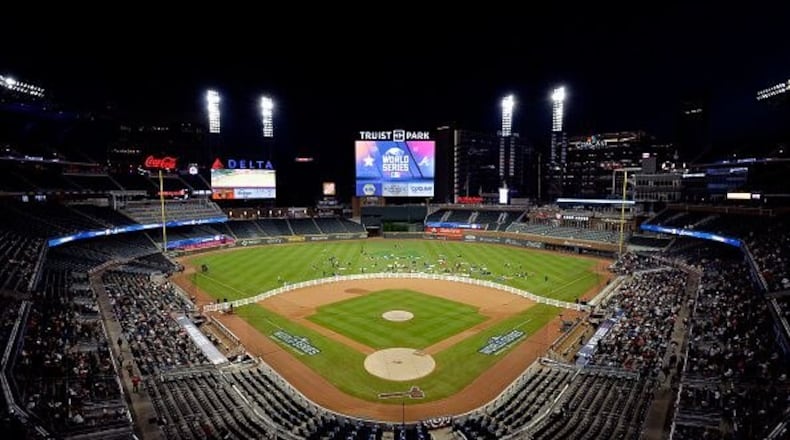The Braves’ financial performance this season “was as impressive as the on-field performance,” the chief executive of team owner Liberty Media said as the company announced quarterly results Thursday.
Greg Maffei, Liberty’s president and CEO, began a conference call with investment analysts by lauding the Braves’ World Series championship as “an excellent team effort.” He praised the “tremendous” players, “Braves lifer” manager Brian Snitker, general manager Alex Anthopoulos’ “excellent mid-season trades” and “all of Braves Country most of all.”
“It was an amazing comeback since the All-Star break, when we were 44-45,” Maffei said. “The team wisely invested in talent at the trade deadline, which helped turn the season around and also generated a great financial performance.”
Maffei’s remarks followed Liberty Media’s disclosure of financial results for the July-through-September quarter that showed the Braves brought in revenue of $234 million during the three-month period as attendance returned to pre-pandemic levels ahead of the postseason run.
The Braves’ revenue increased $22 million, or 10.4%, from $212 million in the corresponding third quarter of 2019, the last MLB season before this one that was played with fans in attendance. In 2020, when a shortened schedule was played without fans in the stands, the Braves’ revenue was $110 million for the July-September quarter.
“Revenue growth more than offset increased operating costs as player salaries and facility and game-day expenses returned to more normalized levels in the current year,” Liberty Media said in Thursday’s report.
Through Sept. 30, the Braves’ 2021 revenue had reached $466 million, including $16 million in the first quarter and $216 million in the second quarter. The Braves will exceed their franchise-record full-year revenue of $476 million, set in 2019, when fourth-quarter financial results, including the postseason games, are added to this year’s total.
For the third quarter, the Braves’ operating profit before depreciation and amortization – the most common metric, along with revenue, for assessing a pro sports franchise’s economic performance – was $58 million, Liberty said. That was up from $6 million and $46 million in the corresponding quarters of 2020 and 2019, respectively.
After depreciation, amortization and stock-based compensation, the Braves showed an operating profit of $35 million for the most recent quarter, compared with a loss of $15 million in the third quarter last year.
Braves executives, including Anthopoulous and team CEO Derek Schiller, have cited this season’s attendance and financial performance for facilitating a series of trades in July that added World Series MVP Jorge Soler, National League Championship Series MVP Eddie Rosario, Adam Duvall and Joc Pederson to the team.
The next economic question, of course, is whether the Braves will sign Freddie Freeman, whose contract expired at the end of the World Series, to a rich new deal. And beyond that, the futures of all four outfielders acquired in July are up in the air: Soler and Rosario are free agents, and Duvall and Pederson can be, too, unless mutual options in their contracts for 2022 are exercised (or unless, in Duvall’s case, the Braves are willing to go to arbitration with him).
Of the Braves’ $234 million in revenue in the most recent quarter, Liberty Media attributed $222 million to baseball (including stadium revenue streams, local and national broadcasting rights and licensing) and $12 million to real-estate development (primarily rental income in The Battery Atlanta mixed-use development).
Liberty Media also disclosed Thursday that the Braves’ debt increased to $721 million. The company attributed the increase, from $694 million as of June 30, mainly to borrowing associated with construction of the second phase of The Battery.
The Braves began this season with reduced seating capacity at Truist Park, initially 33% and then 50%, before becoming the second MLB team (behind the Texas Rangers) to return to full capacity in early May. The Braves drew 2.3 million fans at home during the regular season, the second-most in MLB behind the Los Angeles Dodgers’ 2.8 million.
About the Author
Keep Reading
The Latest
Featured



